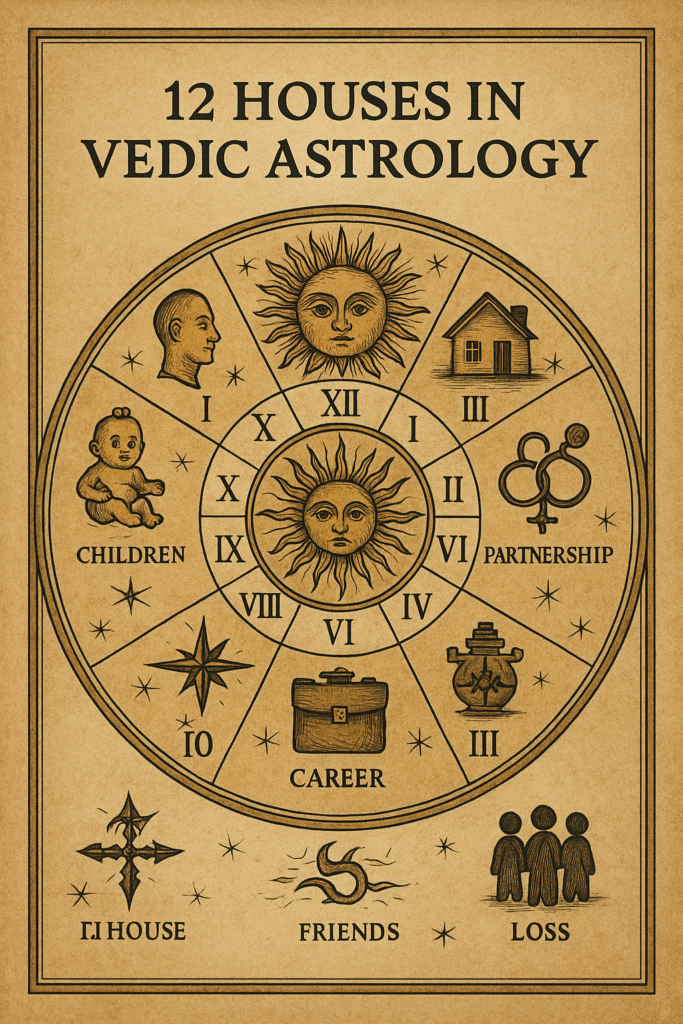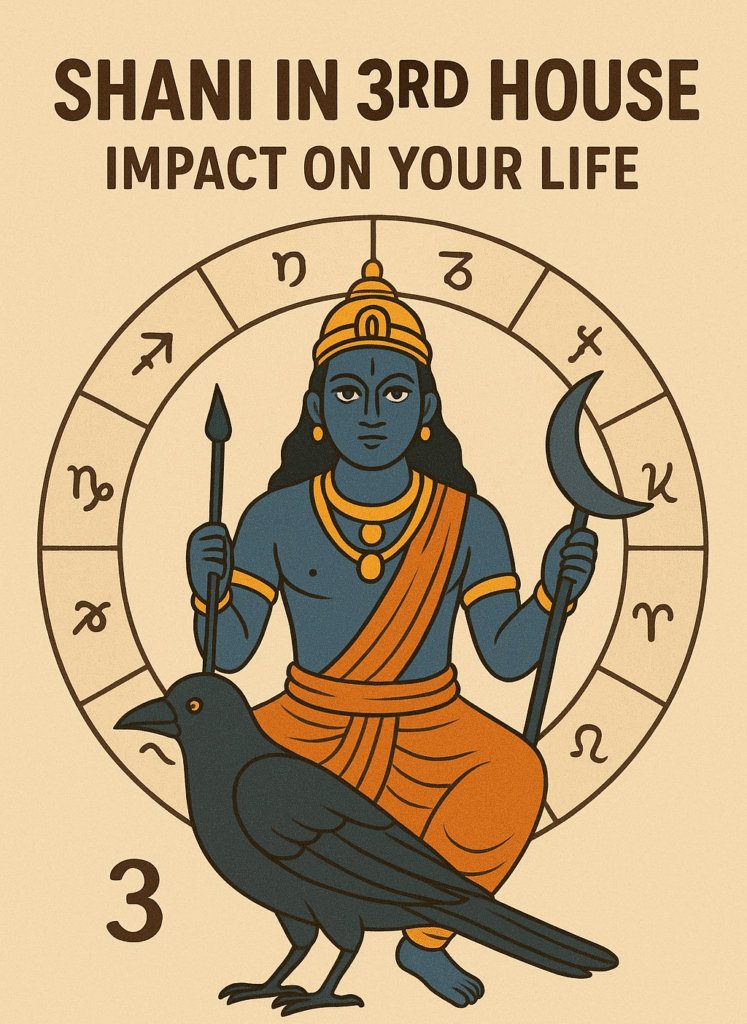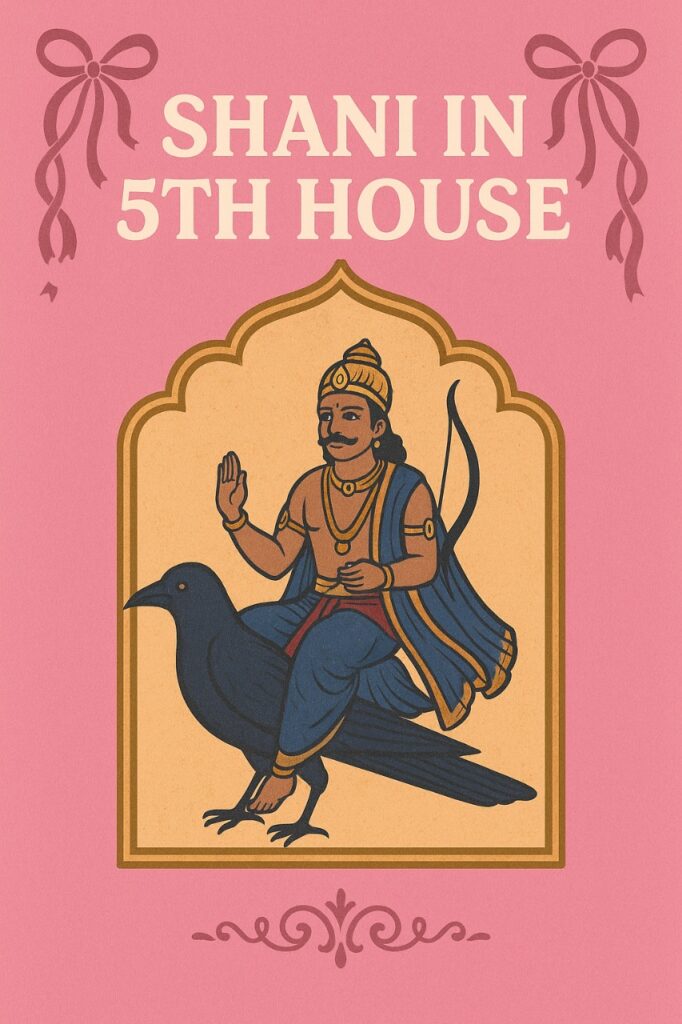In the vast cosmic science of Vedic astrology, a person’s life path is mapped out
through a unique diagram known as the Kundali, or birth chart. This chart is divided
into twelve sections, each referred to as a “house.” These twelve houses are not just
segments; they are windows into different aspects of human life, ranging from
self-identity and relationships to karma, wealth, health, and ultimate liberation.
Understanding the 12 houses is foundational for interpreting any horoscope.
Whether you’re an intermediate learner or a spiritual enthusiast, this guide will help
you dive deeper into the mystical world of astrology through the lens of these
houses.
The Structure of the 12 Houses in Vedic Astrology
The kundali is drawn using a square or diamond-shaped chart in North Indian
astrology or a circular one in South Indian style. These charts are divided into twelve
equal parts, each representing one bhava (house).
Each house in Vedic astrology is governed by a zodiac sign and associated with
specific themes of life. What makes a kundali truly personal is the placement of
planets within these houses and the ascendant (Lagna), which marks the first house.
First House – The House of Self (Tanu Bhava)
The first house represents your personality, physical body, and how you present
yourself to the world. It signifies the moment of birth and lays the foundation for your
entire chart. This house governs your personal ego, vitality, health, and appearance.
Your destiny is greatly influenced by the Lagna lord, the planetary ruler of the sign
that is in the first house.
A well-placed first house reflects confidence, courage, and charm. If afflicted, it may
bring self-doubt or health concerns.
Second House – The House of Wealth and Speech (Dhana Bhava)
This house governs material wealth, family values, early education, speech, and
your attitude toward savings. The second house shows how you earn, manage, and
retain money. It also reflects the nourishment you received from your family and your
upbringing.
Speech patterns, food habits, and vocal talents (like singing or public speaking) can
be judged from this house. It is also linked with facial features, especially the mouth
and throat.
Third House – The House of Courage and Siblings (Sahaj Bhava)
Courage, communication, short journeys, creative expression, and relationships with
siblings all fall under the domain of the third house. It reflects your willpower,
initiative, and day-to-day interactions.
People with a strong third house often excel in writing, media, marketing, or
performing arts.
The House of Mother and Home (Sukha Bhava) is the fourth house.
A deeply emotional house, the fourth represents your inner world, your home, your
roots, your emotional stability, and your relationship with your mother. It also
indicates land, real estate, vehicles, and physical comforts.
This house is the base of the horoscope, literally and symbolically. A strong fourth
house can indicate a peaceful domestic life, and a strong fourth house suggests a
pleasant home life and good property. If afflicted, it may bring restlessness or
separation from the homeland.
Fifth House – The House of Creativity and Children (Putra Bhava)
The fifth house is associated with love, romance, children, education, and creative
self-expression. It is a house of past-life karma and how it manifests as talent,
intuition, and emotional intelligence.
A well-aspected fifth house suggests a fulfilling love life, success in artistic or
academic pursuits, and blessings in the form of children. It also governs speculation,
so stock market success or gambling tendencies may show up here.
Sixth House – The House of Health and Challenges (Roga Bhava)
This is the home of challenges, adversaries, debts, illnesses, and everyday
hardships. It represents your ability to face adversity and maintain discipline through
daily habits. It also governs legal battles, competitions, and service to others.
This house fosters resilience even though it is frequently viewed as malefic. A
person with a strong sixth house can produce doctors, lawyers, soldiers, and
health-conscious individuals. If heavily afflicted, it may result in chronic illness or
repeated financial struggles.
Seventh House – The House of Marriage and Partnerships (Kalatra Bhava)
Directly opposite the first house, the seventh house reflects your relationships with
others, particularly your spouse or long-term partners. It governs marriage, business
collaborations, and public dealings.
It tells you not just about your partner’s personality but also how you relate in
one-to-one settings. The quality of marital life, sexual compatibility, and legal
agreements can be analyzed here.
A harmonious seventh house brings balance, diplomacy, and loyal partnerships. Its
affliction may cause delays in marriage, divorce, or conflict with the partner.
Eighth House – The House of Transformation and Secrets (Ayur Bhava)
The eighth house is deep, enigmatic, and powerful, but it is frequently
misinterpreted. It rules over death, rebirth, inheritance, insurance, joint finances, and
the occult sciences. This house represents transformation through loss and pain,
pushing you to evolve spiritually.
It also governs sexual intimacy, secret knowledge, and hidden fears. Those with
strong eighth house placements may excel in fields like astrology, psychology,
research, and tantra. An afflicted eighth house may cause fear of loss, instability, or
unexpected events.
Ninth House – The House of Luck and Dharma (Dharma Bhava)
This is the house of higher knowledge, philosophy, long-distance travel, religion, and
blessings from past lives. It governs your moral compass, your relationship with
teachers or mentors (gurus), and your connection to divine law.
The ninth house is considered one of the most auspicious houses in a chart. A
strong ninth house grants good fortune, spiritual inclination, and respect for tradition
and dharma (righteous duty). It may also point to chances for overseas study or
travel.
Tenth House – The House of Career and Status (Karma Bhava)
The tenth house governs your professional life, public image, ambitions, and karmic
duties. It tells you about your life mission, what kind of work you’re destined to do,
and how the world perceives you.
Planets in this house play a vital role in career decisions. A strong tenth house often
creates leaders, government officials, or people with fame and authority. Saturn, as a
natural significator of karma, is highly relevant.
Eleventh House – The House of Gains and Aspirations (Labha Bhava)
The eleventh house rules income, social networks, aspirations, and the fulfillment of
desires. It is known as the house of material gains and long-term dreams. It also
governs elder siblings, communities, and large organizations.
Those with a well-placed eleventh house often attract wealth, social influence, and
strong networking skills. It reveals what you desire from life—and your capacity to
achieve it.
Twelfth House—The House of Moksha and Isolation (Vyaya Bhava)
The twelfth house represents everything that lies beyond the material world: losses,
sleep, isolation, hospitals, foreign lands, and ultimately, liberation or moksha. It is a
deeply spiritual house that encourages you to let go of ego and attachments.
Though sometimes associated with exile, expenses, or suffering, this house also
grants access to higher dimensions of consciousness. Yogis, monks, and artists with
a strong spiritual bent often have significant twelfth house activity.
How to Interpret the 12 Houses in a Kundali
To understand how the 12 houses function in your chart:
● Start with your Lagna (ascendant). The zodiac sign rising on the eastern
horizon at your birth becomes your first house.
● Then, look at what planets are placed in each house and how they influence
its theme.
● Study the house lords—the rulers of the signs that govern each house—and
where they are placed.
For example, if your Lagna is Cancer, then Leo becomes your second house, Virgo
your third, and so on. The Moon becomes your Lagna lord, and its placement will
influence your whole chart.
Final Thoughts
The twelve houses in Vedic astrology are not just symbolic—they are practical,
karmic maps of your entire life. From your first breath to your spiritual departure, they
track every lesson, joy, and struggle written in your stars. They help decode
relationships, guide career paths, resolve health concerns, and even offer glimpses
of past and future karmas.
When interpreted wisely, these houses empower you to live more consciously, align
with your dharma, and fulfill your soul’s purpose.
Want to Master Your Kundali?
At Astro Pathshala, we break down the complexities of Vedic astrology into
easy-to-learn lessons. Whether you want to explore your seventh house for marriage
insights or the tenth house for your ideal career path, we’ve got you covered.
Join our courses, get your chart analyzed, and explore the universe within.
Because the best way to know your future is to understand your stars.



